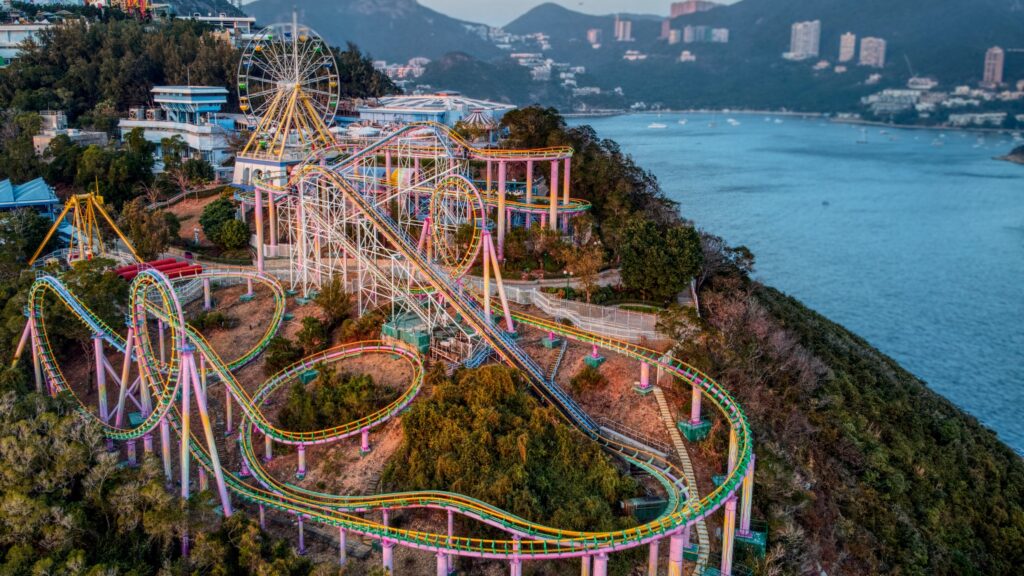Health Insurance in Hong Kong
Moving to Hong Kong
Moving to or living in Hong Kong? Want to understand your choices when it comes to healthcare? Wherever you are heading in the world, it is extremely important that you understand the ins and outs of their medical system. Healthcare in Hong Kong is celebrated as world class, so why not find out more so that you can get the best from it during your stay in Hong Kong? We’ve put together a complete guide to health insurance in Hong Kong help you ensure that you can get the treatment you need while away…
Hong Kong’s Healthcare System
Hong Kong’s residents have the highest life expectancy in the world; 78 for men and 84 for women. This is, in part, due to its highly developed medical services. In Hong Kong the government and Health Authority place high importance on constantly developing the medical sector and this results in the island boasting some of the most advanced medical equipment and facilities in the world.
Is Healthcare Free in Hong Kong?
Whilst Hong Kong boasts some of the finest healthcare services in the world, it comes with a premium price tag. No healthcare is free in Hong Kong and only national citizens and those granted with permanent residency can benefit from the Hong Kong Identity Card – which grants subsidised medical care.
For expats without permanent residency, it is worth remembering that there is little discrepancy between public and private healthcare costs without being a permanent resident.
Private Expat Health Insurance Hong Kong
Foreigners without residency in Hong Kong usually purchase international health insurance. Although private fees aren’t much more than public for expats without residency, many choose to be fully covered for peace of mind. Not all employment packages for expats include healthcare and, in these circumstances, foreigners can seek out their own.
Moving to Hong Kong
Hong Kong is an autonomous territory of China after being handed over by the British in 1997. Today the “Pearl of the Orient” is a very special place, drawing expats and visitors from around the world to sample her many delights.
Translating to “fragrant harbour”, Hong Kong is considered one of the most important financial hubs in the world. It is the centre for a number of banking operations and boasts one of the largest stock exchanges in the world. It is also considered the largest centre in the world for IPOs.
All this activity is tucked into a tiny fraction of the available land, making it one of the most densely populated areas in the world. Much of the population therefore lives and works in the many high-rise buildings and Hong Kong boasts the highest density of skyscrapers to be found anywhere in the world. As a result it is also considered the most “vertical” city in the world with more people living at high elevations than anywhere else on the planet.
However there is no need to feel claustrophobic in response to the density of the urbanization to be found here. 40% of the landmass has been reserved for nature reserves meaning that greenery and nature is only ever a short train ride away.
Moving to Hong Kong
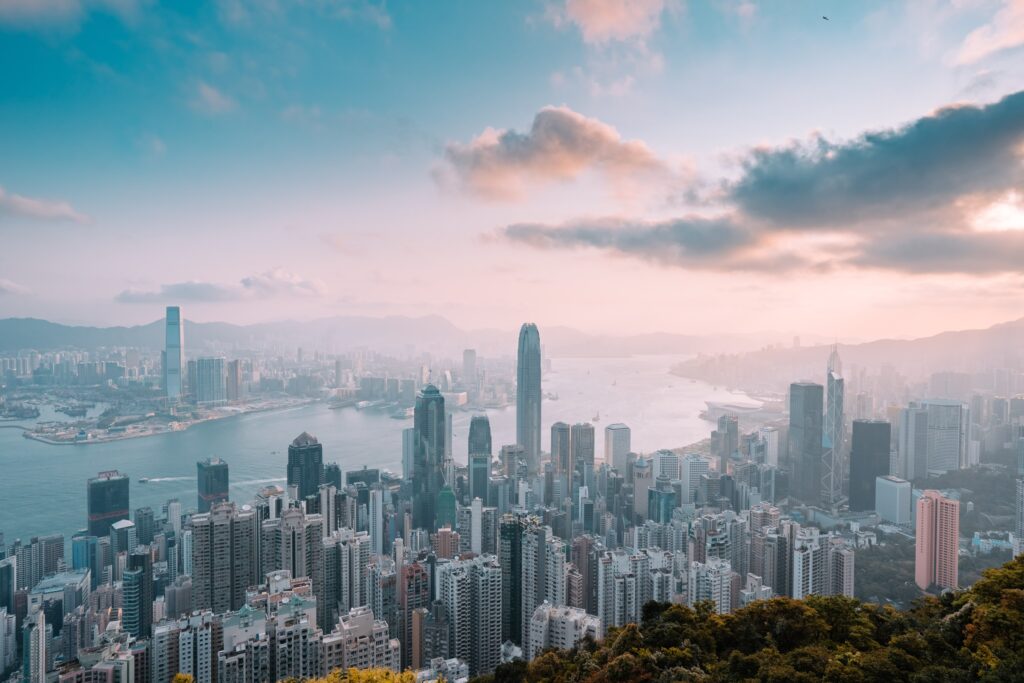
Weather in Hong Kong
Hong Kong’s climate is best described as humid and subtropical.
The region has four distinct seasons each year. Spring is typically warm and wet, with high levels of humidity. Summer can be very hot where 30’C temperatures are not unheard of. Combined with high levels of humidity summer in Hong Kong can take some getting used to. The summer months are also when typhoons are most likely to occur.
In autumn the weather becomes rather more pleasant which is typified by pleasant temperatures and dry weather, while winters are mild and sunny. Generally speaking, the winter months are considered the “best” time of year when the temperature and humidity drop to more manageable levels while precipitation is also lower.
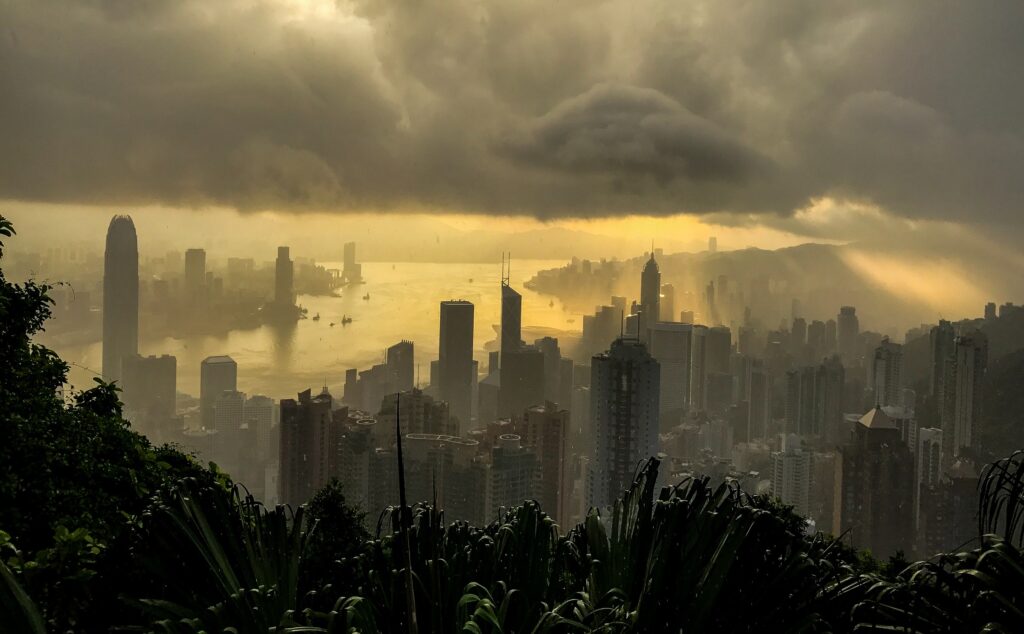
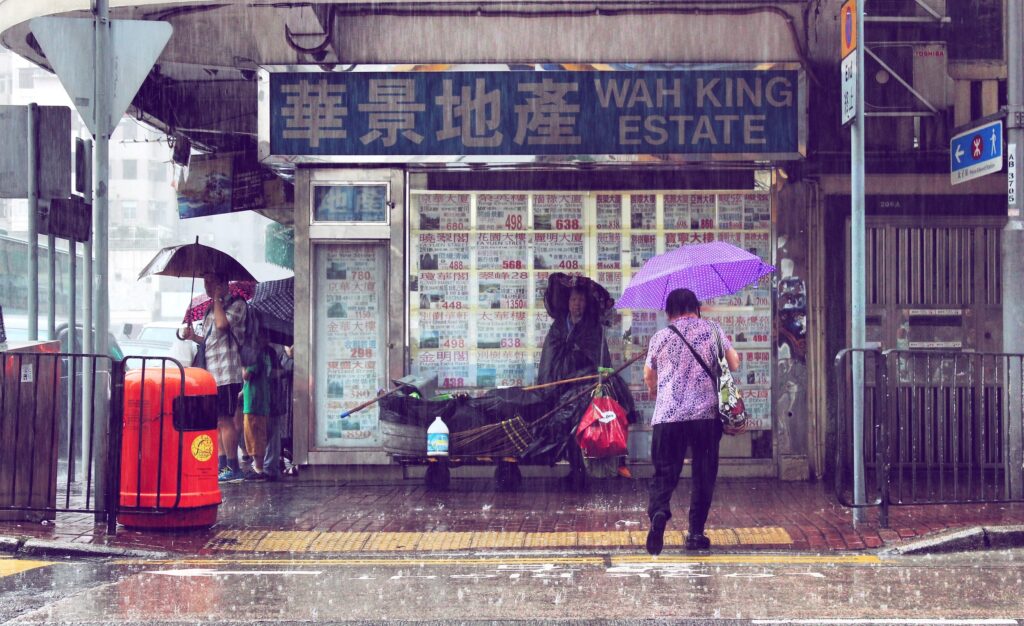

It is interesting to note that Hong Kong’s steep hills combined with heat and humidity has led to some unique transport innovations. Walking up the many steep inclines in summer is less than pleasant given the environmental conditions so solutions have been found in this technologically-advanced part of the world.
Arguably most notable is the Central-Mid-Levels escalator which is considered the longest covered escalator in the world. It runs to an impressive 800 metres in length and transports residents up an elevation of 135 metres.
Whilst many people’s view of Hong Kong is that of a modern urban centre, the reality is that less than 25% of the landmass now known as Hong Kong is actually developed. The more mountainous areas are protected by law as wildlife parks and offer rich grasslands at their peaks with secondary rainforest at lower elevations.
The strange juxtaposition of major urbanization sitting beside largely untouched mountain wilderness means there is very little agriculture to be found here. As a result, 90% of the goods sold in Hong Kong must be imported. This helps to explain why living expenses here are considered so expensive.
Hong Kong Culture
Hong Kong is an area of great contrast. While 94% of the population is classed as ethnic Chinese there has long been an established expat population here. This means that a range of different cultural influences may be felt in Hong Kong. For the expat or traveller this also means that non-natives are part of everyday life here and most visitors are easily accepted.
On the one hand Hong Kong represents one of the most expensive and technologically advanced areas of the world. It is considered one of the world’s major financial hubs where, due to the limited land on offer, high-rise buildings dominate. Hong Kong also has the infrastructure to support this growing workforce with over 90% of trips being carried out on the highly efficient public transport system.
Despite being one of the most densely populated areas in the world Hong Kong is surprisingly clean and tidy. The levels of hygiene found here could almost be considered a national obsession.
On the other hand traditional Chinese culture is still a keystone of life in Hong Kong. Good manners and treating others respectfully are trademarks of the culture here. There are other cultural Chinese quirks to be seen. Many numbers, for example, have deeper meanings to the Chinese population than to Western eyes. The number 4 is generally considered bad luck, while 8 is considered a lucky number. For this reason many buildings in Hong Kong omit floor numbers with a “4” in them – thus the 4th floor may well be known as the 5th and so on.
In addition note that many businesses close over Chinese New Year so expats should keep this in mind when trying to arrange business meetings, healthcare visits and so forth.
Language in Hong Kong
With such a large proportion of the population tracing their heritage to mainland China it should come as no surprise that Chinese is the prevalent language in Hong Kong. Of the many dialects in existence Cantonese tends to dominate, though Mandarin is also frequently spoken.
English-speakers however need not feel lost. As a former British colony English is considered a second language by many people here. Over a third of the population uses English as a second language, many schools include English-language tuition and it is not unusual to even encounter road signs in English too.
As a result while some basic Chinese can be beneficial (your stumbling attempts will be viewed in good humour as a grave sign of respect) in reality many expats find that in most situations English will be perfectly acceptable.
Language in Hong Kong
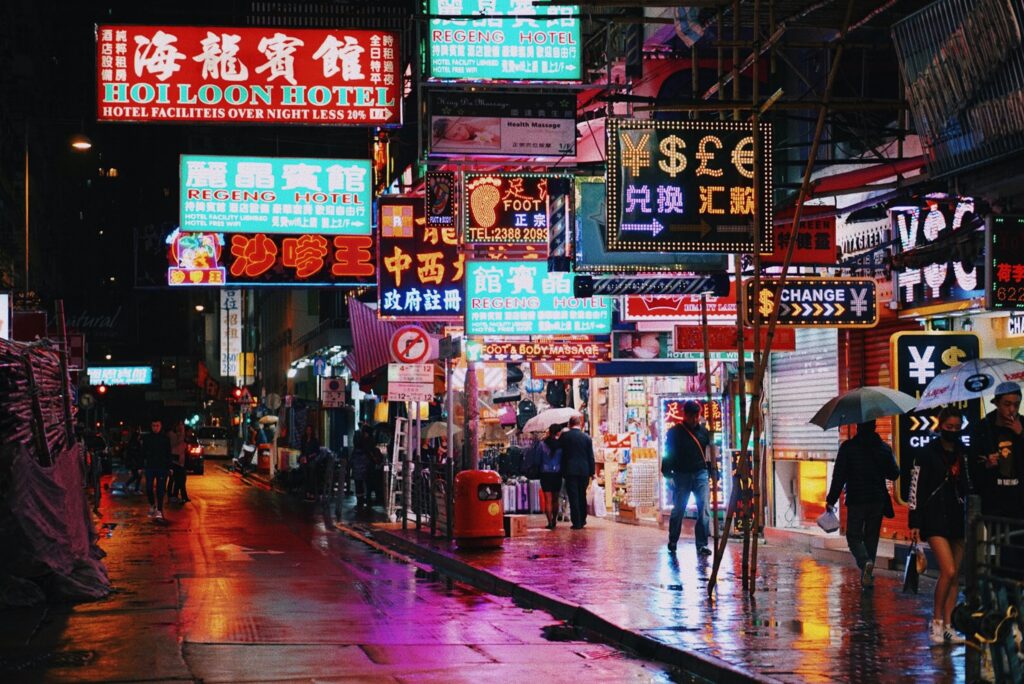
Public Transport in Hong Kong
Hong Kong has one of the most impressive and efficient public transport systems in the world. The range of transportation options are almost bewildering to the newcomer, but they largely eliminate the need for owning a car.
This is just as well because private car ownership within Hong Kong can be both an expensive and a frustrating experience. To dissuade residents from purchasing a new car the registration fee can be up to 100% of the value of the car and there are very few places to park. In almost every case, therefore, public transport represents a more practical and economical alternative.
For visitors who cannot be without their own vehicle, visitors from pre-approved countries can use their own license for up to 12 months. After this period it will be necessary to exchange the license issued in your home country for a local alternative, though the process is quite simple.
The backbone of the Hong Kong public transport system is the Mass Transit Railway – often shortened to simply the “MTR”. This is a vast network of 152 rail stations both above ground and below and servicing most of the area. Due to the range of clear maps and signposts, the MTR is normally the easiest – and quickest – mode of transport to become familiar with.
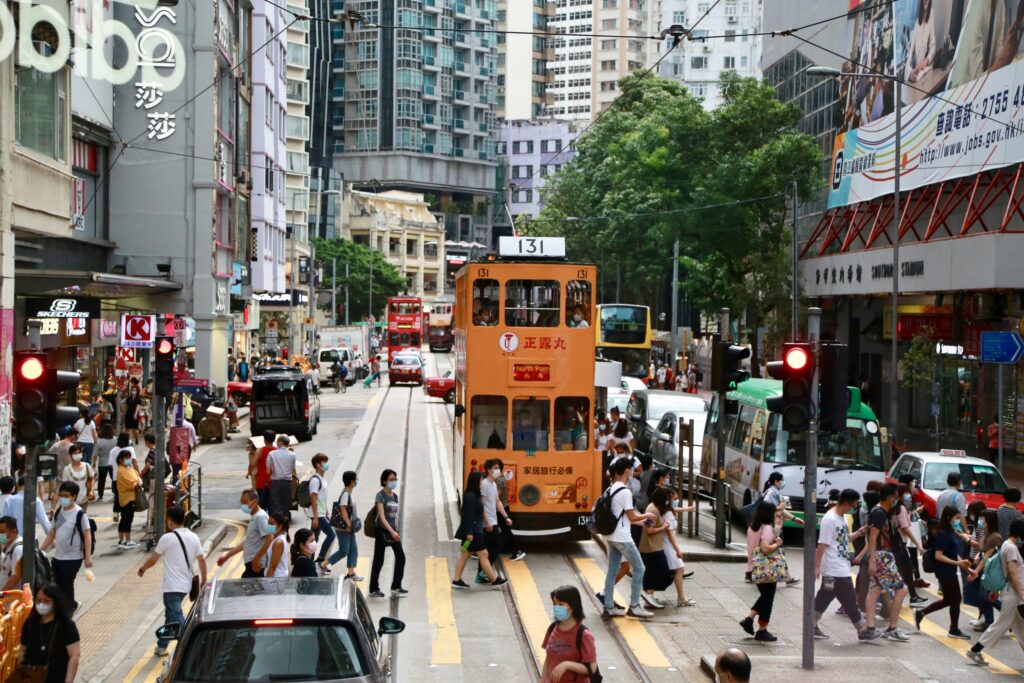
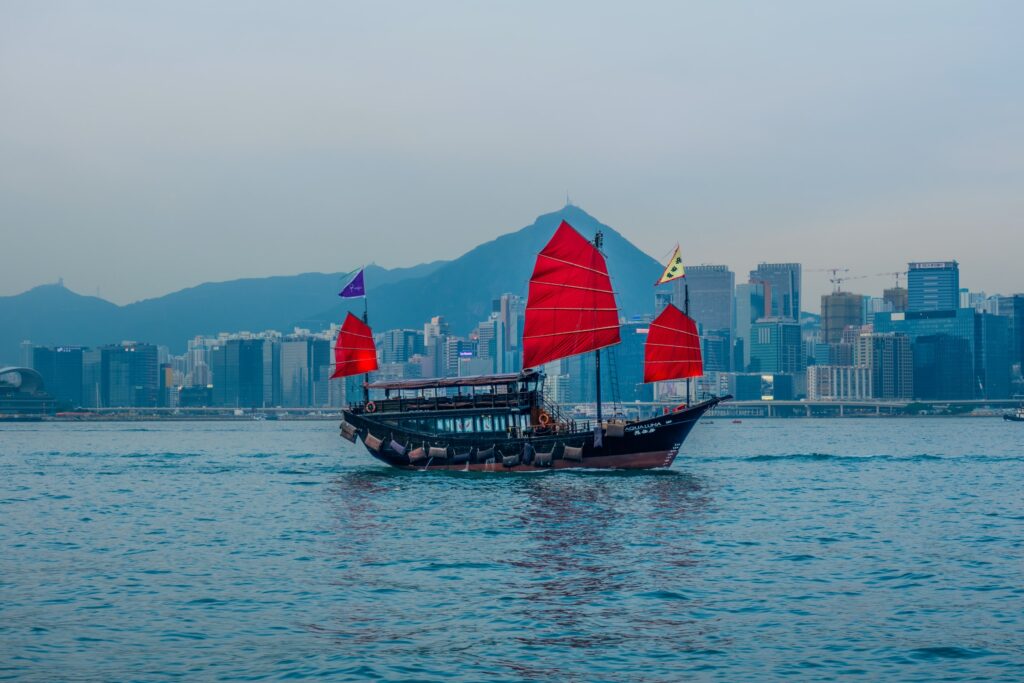
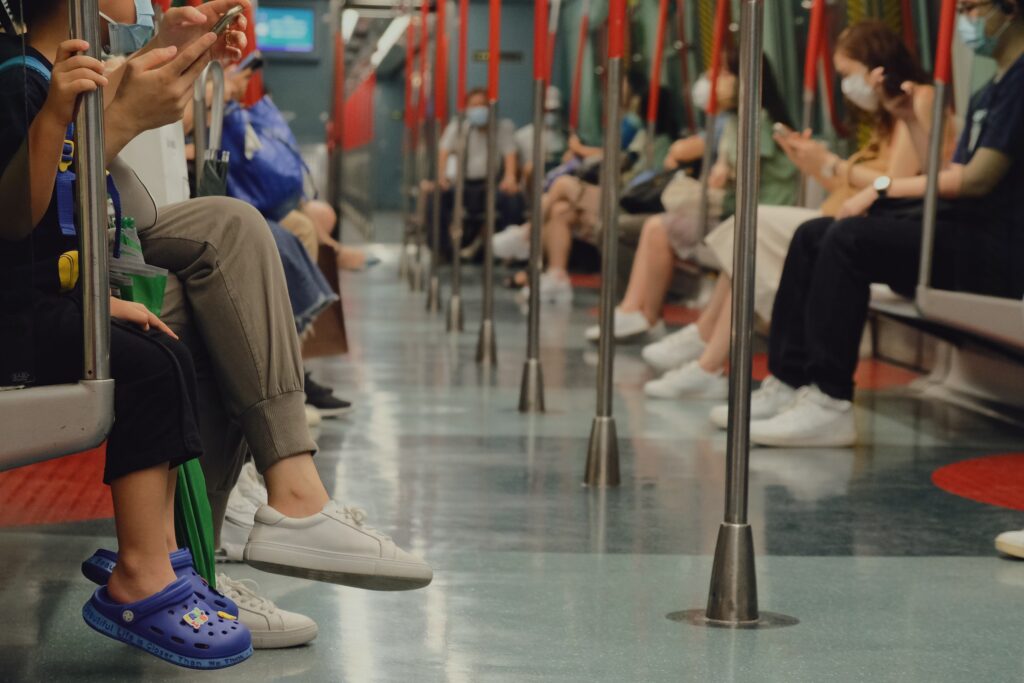
Other forms of transport exist – but may be more problematic for newcomers to gain familiarity with. There are, for example, numerous minibuses, but their colour dictates their activity. Yellow and green buses travel a fixed route. In contrast red and yellow buses may go anywhere – most will have their final destination written on a board at the front. Getting to grips with the bus system can therefore take time – and seeking advice from locals can be highly beneficial.
Taxis and chauffeur-driven cars may be hired, but there are three different forms of taxis serving different areas. To make full use of taxis then it be necessary to become familiar with the areas of Hong Kong so you can be certain you are flagging down a driver servicing that area.
A network of trams – often known locally as “Ding Dings” – exist. While they are slow, trams can provide excellent sight-seeing opportunities. For new residents taking a tram ride up into the hills allows you to explore the local area in comfort and without worry of getting lost.
Lastly a number of ferry services travel across Victoria Harbour or to smaller outlying islands. Pleasantly taking a trip across the harbour provides some of the very best views possible of this gleaning Asian jewel. Viewed at night, when the skyscrapers are lit up against the charcoal sky, provides a view that leaves many speechless.
Note that Hong Kong maintains a practical payment system for many of the public transport services on offer. Comparable to London’s Oyster Card or New York’s MetroCard, Octopus cards are widely available in Hong Kong. Rather than worrying about exact change (as required on many services) you can simply swipe your card to make payments. Indeed while Octopus cards are accepted on railways, buses and ferries they can also be used in some shops to pay for groceries and suchlike. Simply top up your card with fresh funds when required.
Healthcare in Hong Kong
Hong Kong is typically clean and safe, with very few of the major health concerns seen in other destinations. Arguably the greatest risk is the pollution which can lead to respiratory conditions. Asthmatics should take particular care to bring suitable medication with them.
Hong Kong residents have one of the highest life expectancies in the world which is hardly surprising when you consider their world-class healthcare system. Numerous hospitals across Hong Kong offer reasonably-priced treatment to locals and expats alike. In order to receive government-subsidized treatment residents simply require a Hong Kong Identity Card.
Many of the doctors have trained overseas and/or are expats themselves so a large number speak fluent English.
There are also a number of private medical establishments, each of which has been accredited by the UK health authorities. Many expats opt to use these private facilities as they can offer shorter waiting times and superior levels of care.
For this reason it is advisable to consider Expat Insurance or fully-featured International Travel Insurance before arriving in Hong Kong. Such policies will enable you to pick and choose the best healthcare options for your needs.
Hong Kong Currency
The official currency is the Hong Kong dollar which is pegged to the US dollar. It should come as no surprise that in such a major financial centre accessing funds is rarely a problem. A network of ATMs proliferates, credit cards are widely accepted and currency exchange offices are easily found.
When exchanging currency the best rates are normally to be had from banks though note that higher fees may be charged for non-account holders. Long-term expats may therefore find that opening a local bank account can be cost effective.
Lastly note that whilst traveller’s cheques can be exchanged at many banks you will need your passport as a form of identification before they can be processed.
International Schools in Hong Kong
Schooling is one area of Hong Kong where the facilities on offer can be problematic. Compulsory education amounts of nine years of tuition, though realistically in this highly competitive culture many more years of study are completed by most pupils. Private tutoring is also commonplace, with children devoting much of their free time to extra-curricular learning.
Hong Kong does offer a large number of schools but it is normal for lessons to be taught in Cantonese. Unless your children are particularly young therefore it can be difficult for them to assimilate and pick up the Chinese language.
More preferable for many expats are the number of privately-run international schools. Here lessons are more frequently taught in English and the curriculum is more likely to follow the British system.
However gaining entry into these international schools is far from easy. Places are severely limited and many locals send their own children to these schools for the superior learning experience. Admission is often skills-based and waiting times can be long.
For this reason it is not unheard of for future expats to fly their children into Hong Kong especially for selection tests before their eventual move to the area.
There is much discussion at present on the state of schools in Hong Kong, with some large corporations complaining that it is stifling their ability to attract the calibre of talent they desire. Pressure from big business means that the situation is likely to improve in the future but right now many expats rely on home tutoring as the only viable solution.
International Schools in Hong Kong
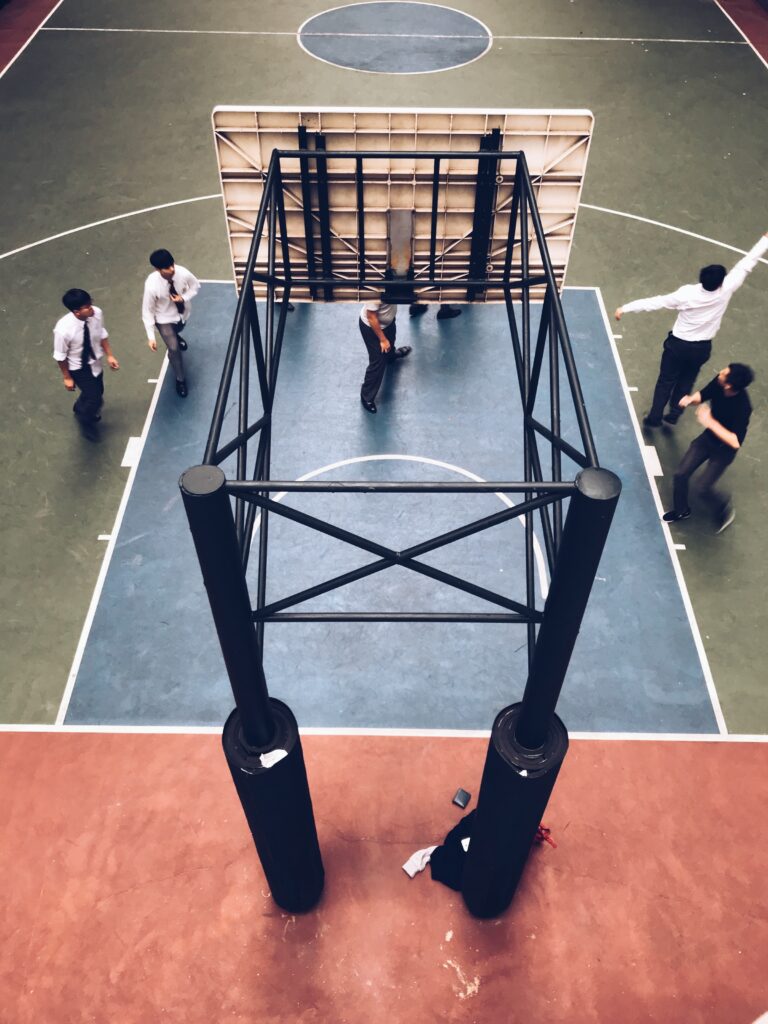
Hong Kong Food and Drink
Hong Kong is considered a gourmet paradise. With the prevalent Chinese influence it should come as no surprise that lovers of Chinese food are well served.
Sweet and sour pork is reputed to have originated here and there are a range of other “national dishes” that have gained popularity with visitors. This includes dim sum, chickens feet and the traditional Cantonese favourite of roast goose. A perennial favourite is an egg custard waffle known simply as “eggette”.
The water in Hong Kong is generally safe to drink in urban areas though in more rural areas it is advisable to boil water before drinking or rely on bottled water. For an authentic Hong Kong beverage order an iced tea enlivened with condensed milk.
However Chinese cuisine is far from the only food on offer in Hong Kong. The area has drawn influences from around the world and one can find anything from fast food joints selling burgers to Michelin-starred fine dining restaurants.
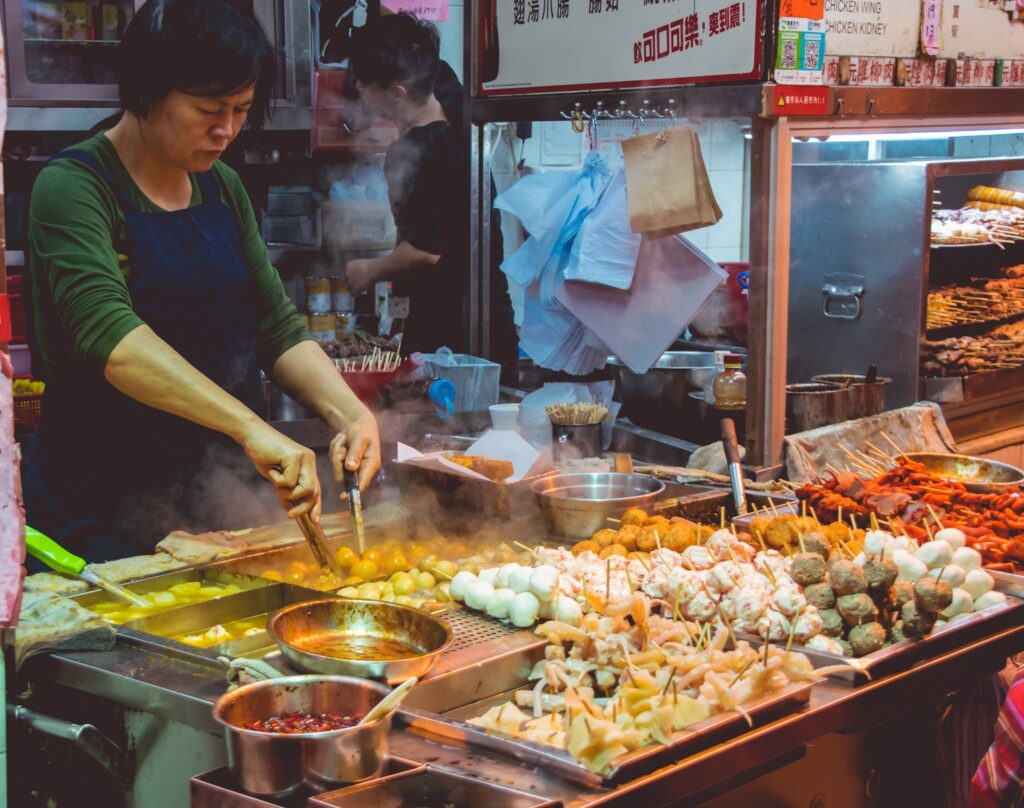
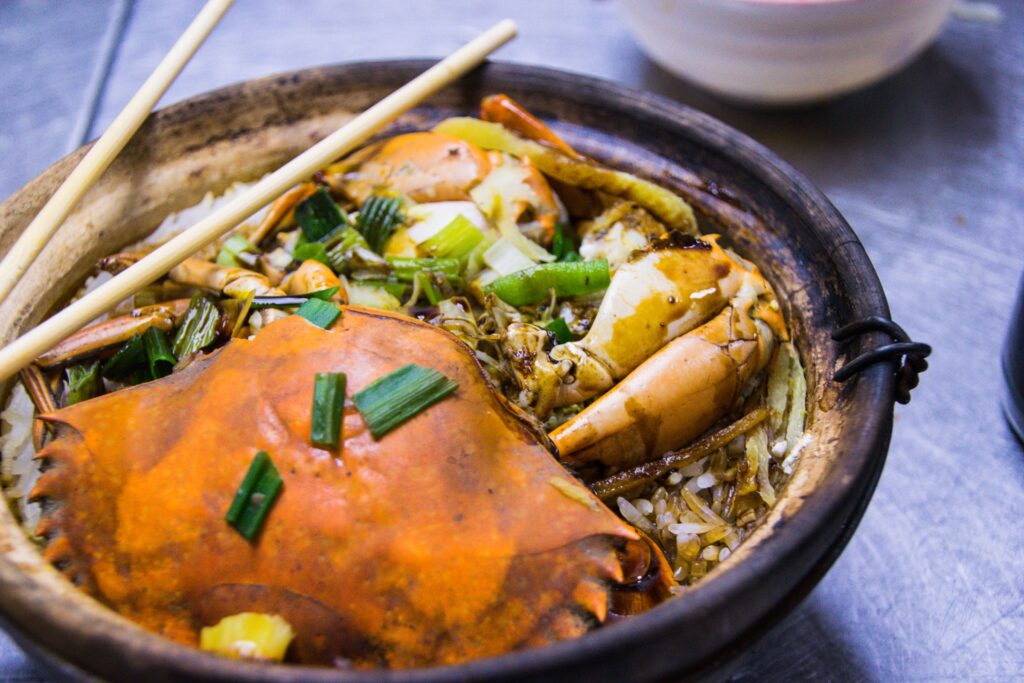

Crime in Hong Kong
Hong Kong is considered a reasonably safe destination for visitors. Crime rates here are impressively low, with most activity relating to minor thefts or pickpocketing.
Besides the aforementioned pollution, the other major concern is typhoons which can cause major disruption. The typhoon season runs from April to October and visitors are advised to keep an eye on local media for warnings of incoming storms.
As in the UK, emergency services may be reached by dialling 999.
Places to Visit in Hong Kong
While expats in Hong Kong may work hard, there are plenty of opportunities to unwind. For such a small area Hong Kong has a surprising number of impressive sights worthy of your attention. Here are a few of our favourites:
Victoria Peak
The highest area on Hong Kong Island provides an unrivalled view of the city skyline. Take the funicular railway to the top to enjoy the cool breezes, the exclusive properties and public parks and views that stretch for miles.
Victoria Peak
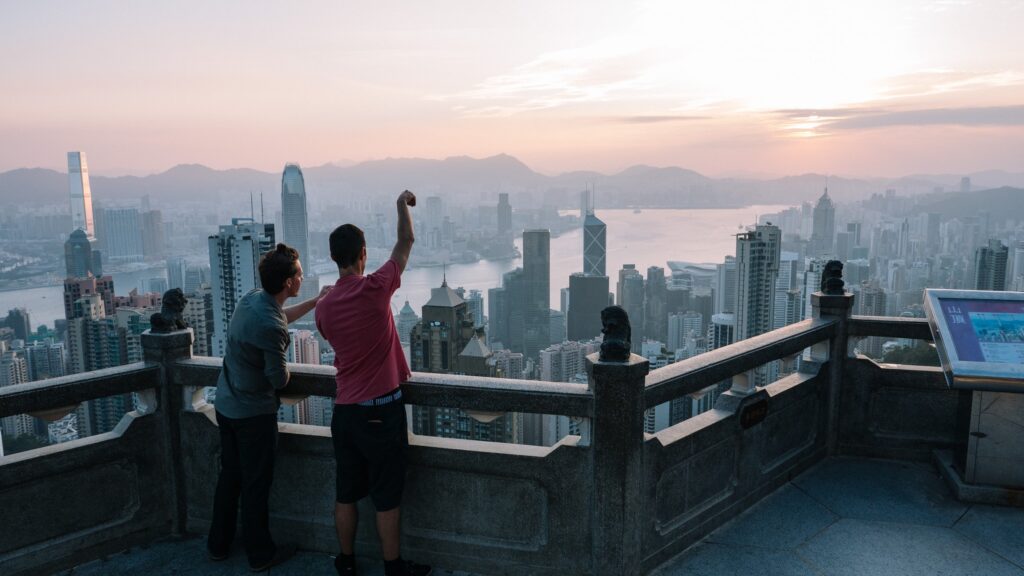
Symphony of Lights
Ranked by the Guinness Book of Records as the world’s largest permanent light and sound show the show starts at 8pm each night. Over 40 buildings on both sides of Victoria Harbour put on a mesmerizing show of laser beams and floodlights synchronized to music.
Symphony of Lights
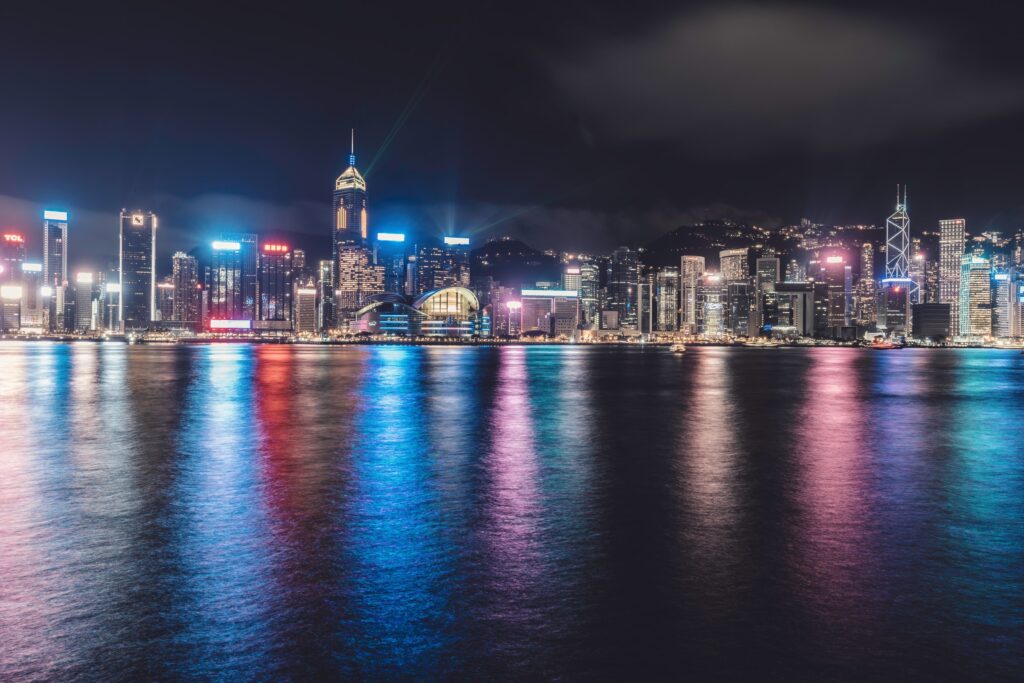
Star Ferry Trip
The Star Ferry transports passengers across the harbour from Hong Kong Island to Kowloon. While such a journey clearly has practical benefits, a journey on the Star also offers stunning sights of the city skyline. For the ultimate experience try to time your journey for the Symphony of Lights for the best view of the nightly laser show.
Star Ferry Trip
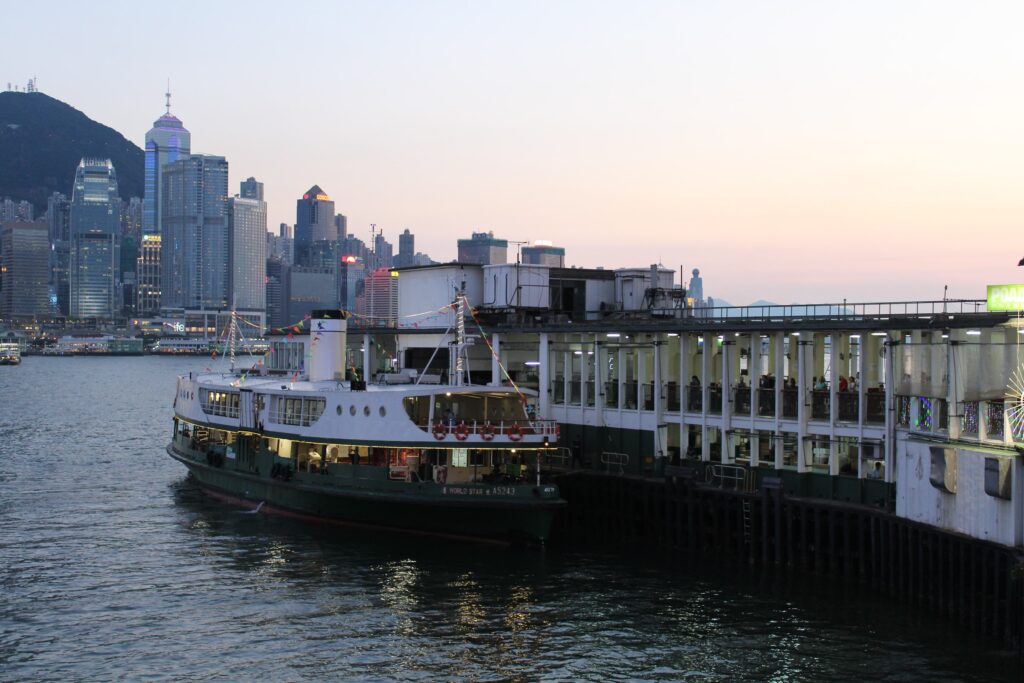
Lantau Island
Lantau is the largest outer-lying island in Hong Kong and offers a chance to experience a little culture and history. Here visitors can enjoy Po Lin monastery with its 26 metre high Buddha and the 70 kilometre long Lantau hiking trail. For visitors with children Hong Kong Disneyland can also be found on the northern edge of the Lantau.
Lantau Island
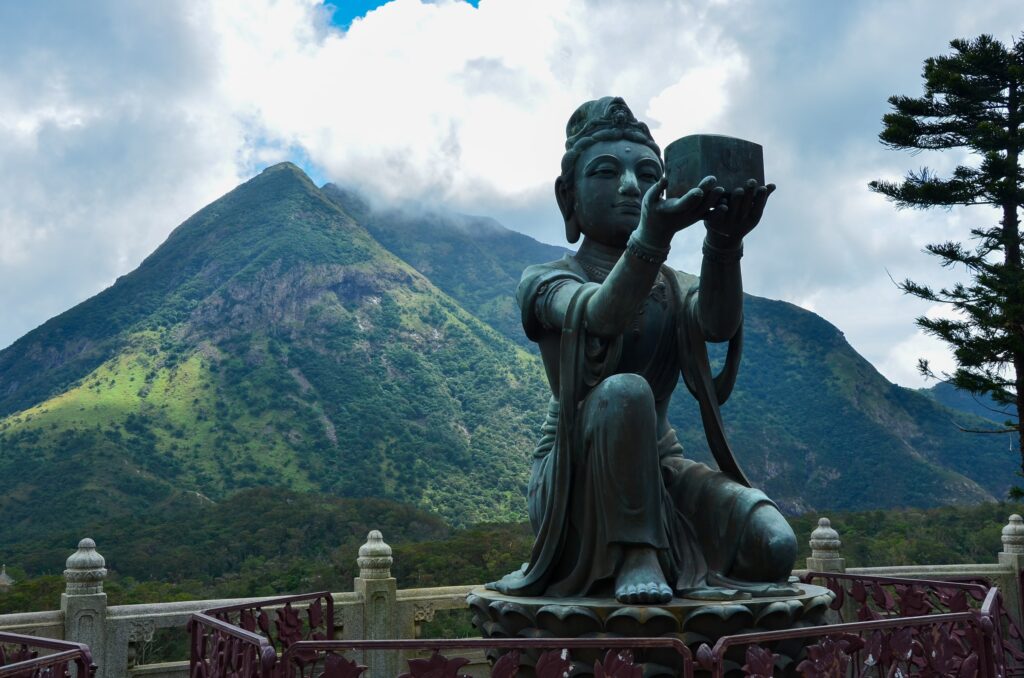
Ocean Park
The largest theme park in Asia, Ocean Park affords visitors the opportunity to get up close and personal with a wide range of marine life. The park also offers giant pandas and a huge range of rides.
Ocean Park
